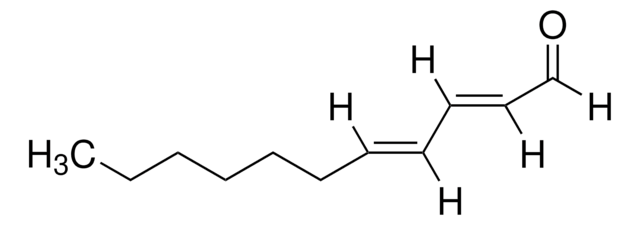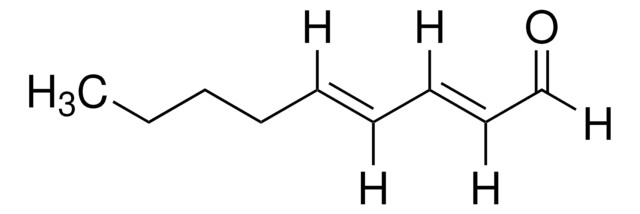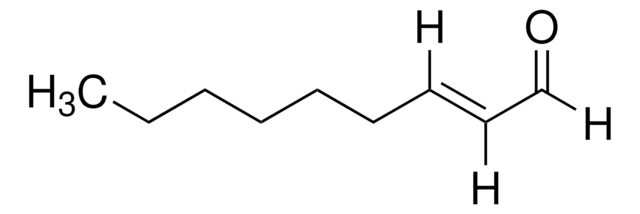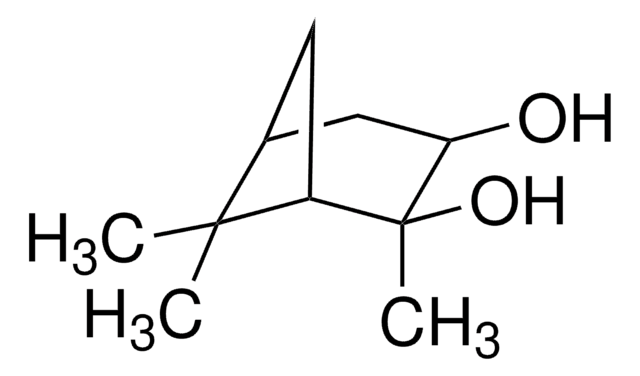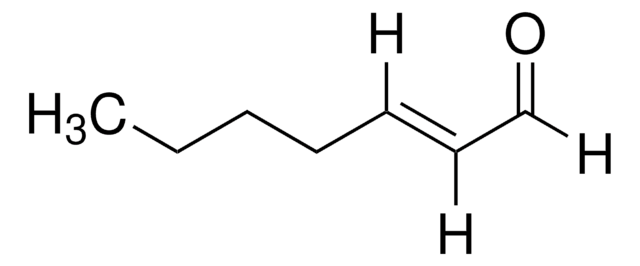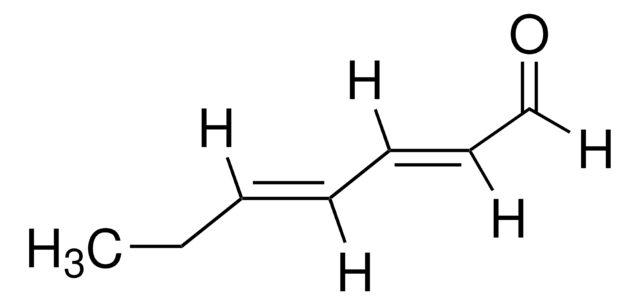180513
trans,trans-2,4-Decadienal
technical grade, 85%
Sign Into View Organizational & Contract Pricing
All Photos(1)
About This Item
Linear Formula:
CH3(CH2)4CH=CHCH=CHCHO
CAS Number:
Molecular Weight:
152.23
Beilstein:
1704897
EC Number:
MDL number:
UNSPSC Code:
12352100
PubChem Substance ID:
NACRES:
NA.22
form:
liquid
Assay:
85%
Recommended Products
grade
technical grade
Quality Level
vapor density
>1 (vs air)
Assay
85%
form
liquid
refractive index
n20/D 1.515 (lit.)
bp
114-116 °C/10 mmHg (lit.)
density
0.872 g/mL at 20 °C (lit.)
functional group
aldehyde
storage temp.
2-8°C
SMILES string
[H]C(=O)\C=C\C=C\CCCCC
InChI
1S/C10H16O/c1-2-3-4-5-6-7-8-9-10-11/h6-10H,2-5H2,1H3/b7-6+,9-8+
InChI key
JZQKTMZYLHNFPL-BLHCBFLLSA-N
Looking for similar products? Visit Product Comparison Guide
General description
trans,trans-2,4-Decadienal reacts with cytochrome c to form an adduct.
Signal Word
Warning
Hazard Statements
Precautionary Statements
Hazard Classifications
Eye Irrit. 2 - Skin Irrit. 2
Storage Class Code
10 - Combustible liquids
WGK
WGK 2
Flash Point(F)
213.8 °F - closed cup
Flash Point(C)
101 °C - closed cup
Personal Protective Equipment
dust mask type N95 (US), Eyeshields, Gloves
Choose from one of the most recent versions:
Already Own This Product?
Find documentation for the products that you have recently purchased in the Document Library.
Carlos A O Sigolo et al.
Journal of bioenergetics and biomembranes, 40(2), 103-109 (2008-03-28)
Lipid peroxidation produces a large number of reactive aldehydes as secondary products. We have previously shown that the reaction of cytochrome c with trans,trans-2,4-decadienal (DDE), an aldehyde generated as a product of lipid peroxidation in cell membranes, results in the
Ana Bartual et al.
Marine drugs, 18(3) (2020-03-18)
Polyunsaturated aldehydes (PUAs) are bioactive molecules suggested as chemical defenses and infochemicals. In marine coastal habitats, diatoms reach high PUA production levels during bloom episodes. Two fractions of PUA can usually be analyzed: pPUA obtained via artificial breakage of collected
Anna Lettieri et al.
Marine drugs, 13(3), 1451-1465 (2015-03-20)
The anti-proliferative effects of diatoms, described for the first time in copepods, have also been demonstrated in benthic invertebrates such as polychaetes, sea urchins and tunicates. In these organisms PUAs (polyunsaturated aldehydes) induce the disruption of gametogenesis, gamete functionality, fertilization
Bárbara Úbeda et al.
Bioresource technology, 228, 210-217 (2017-01-09)
The aim of this work was to study the optimal growth and high value-added production of the microalgae Coelastrum cf. pseudomicroporum Korshikov cultivated in urban wastewater. It was observed that C. cf. pseudomicroporum grew ideally in this medium, acting as
Linda Schreiner et al.
Scientific reports, 8(1), 8294-8294 (2018-05-31)
Being one of the most common trees in forests, Pinus sylvestris L. is a frequently used raw material for wood products. Its specific odour is, however, mostly unresolved to date. Accordingly, we investigated Scots pine wood samples grown in Germany
Our team of scientists has experience in all areas of research including Life Science, Material Science, Chemical Synthesis, Chromatography, Analytical and many others.
Contact Technical Service
